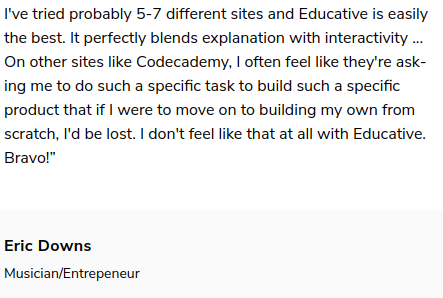What does Kubernetes do?
Kubernetes is an open-source container management tool originally created by Google. It automates computer application deployment, management and scaling.
According to stackshare, over 2800 companies use Kubernetes in their tech stacks including:
And beyond.
This post contains affiliate links. I may receive compensation if you buy something. Read my disclosure for more details.
TLDR: Best Kubernetes Course
🔥 Best Overall 🔥
Kubernetes for Developers: Linux Foundation
💸 Best Value 💸
Kubernetes Docker Tutorial: Complete Course – 2 in 1 Hands On!: BitDegree
Best Kubernetes Course: At a Glance
| Interactive or video-based learning | Level | Duration | Support | Certificate | Cost | |
| A Practical Guide to Kubernetes: Educative.io | Interactive | Intermediate | 20 hours | ✅ | ✅ | $49 per year for the course // $59 per month or $199 per year for all courses and Learning Tracks |
| Kubernetes for Developers: Linux Foundation | Video | Intermediate | 35 hours | ✅ | ✅ | $299 for the course |
| Kubernetes Docker Tutorial: Complete Course – 2 in 1 Hands On!: BitDegree | Video | Beginner | 7 hours | ✅ | ✅ | $247 for the course |
| Kubernetes for Developers: Core Concepts: Pluralsight | Video | Beginner | 4.5 hours | ❌ | ✅ | $29 per month or $299 per year for all courses and Learning Tracks |
| Introduction to Containers w/ Docker, Kubernetes & OpenShift: Coursera | Video | Beginner | 11 hours | ✅ | ✅ | $39 per month for the course |
Best Kubernetes Course
1. A Practical Guide to Kubernetes: Educative.io
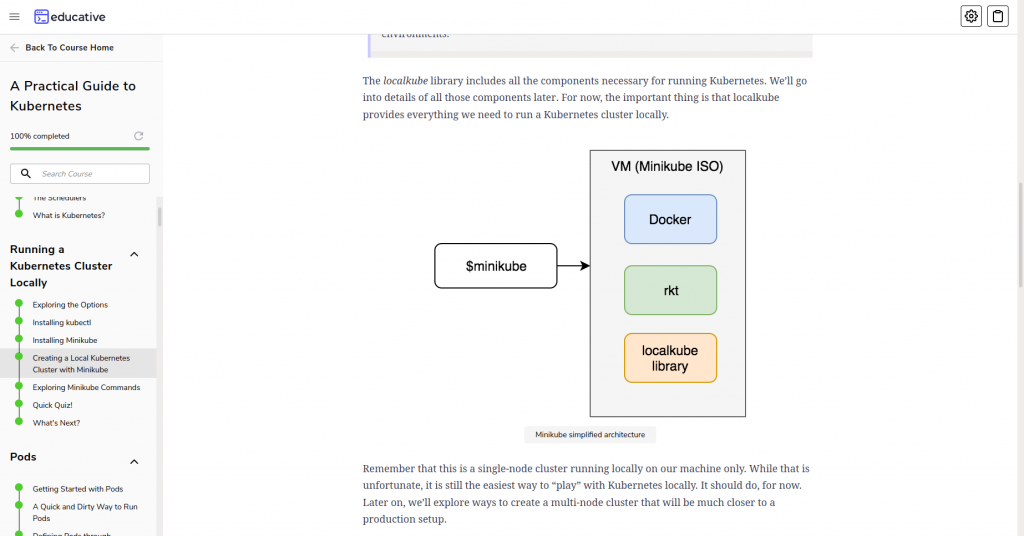
While Educative.io is typically an interactive learning environment, A Practical Guide to Kubernetes is a read-only course jam-packed with over 800 code snippets. Take note that it’s one of two intermediate courses on our list. The rest are beginner courses.
⛏️ Educative.io is consistently our top pick. Read our full Educative review to find out why.
Course Layout
A Practical Guide to Kubernetes contains 15 modules where you’ll discover the fundamentals of Kubernetes:
- running a Kubernetes cluster locally
- pods
- services
- ingress
And beyond.
As you progress, you’ll learn how to build, test, deploy and upgrade applications.
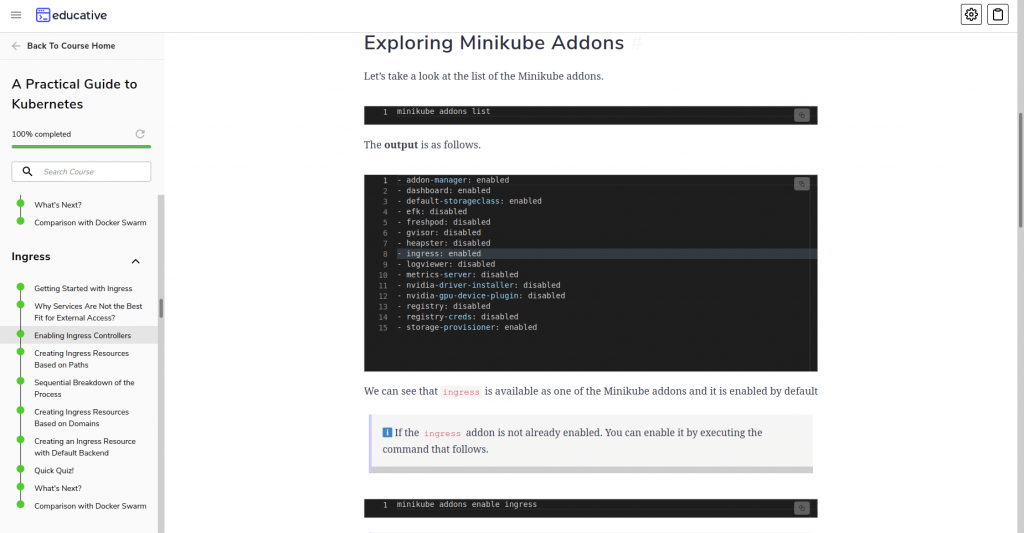
Note: Educative.io has more Kubernetes courses. Explore their full catalog.
Eric Downs finally found his go-to platform with Educative.io:
🔥 Geena’s Hot Take
Educative.io is easily the best platform for self-taught developers who are serious about learning.
If you’ve got a basic understanding of the cloud and think you’re up for an intermediate course, take A Practical Guide to Kubernetes.
There’s no fluff, no BS. Instead, you’ll find thorough, understandable explanations that won’t leave you in the dust or begging for more like some other platforms.
Plus Educative.io has other intermediate and advanced Kubernetes courses, so you’ll get the most bang for your buck if you sign up for a yearly subscription.
💰 Cost: $49 per year for the course // $59 per month or $199 per year for all courses and Learning Tracks
⏲️ Duration: 20 hours
📉 Level: Intermediate
🖥️ Format: Interactive learning
💪 Support: Yes
🎖️ Certificate: Yes
📚 Ready to level up your container orchestration skills? Check out the book Mastering Kubernetes.
2. Kubernetes for Developers: Linux Foundation
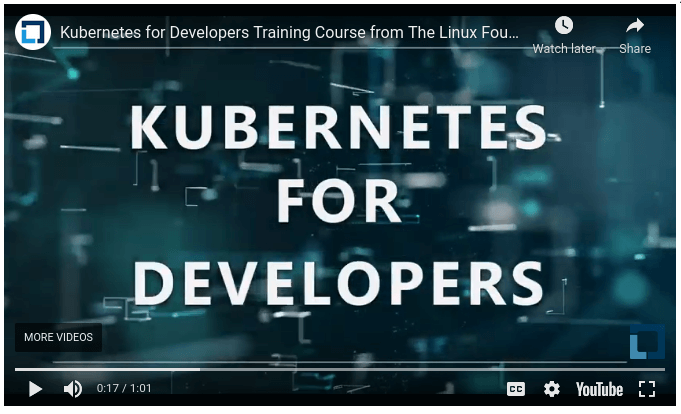
The Linux Foundation is one of the most highly-regarded platforms in the tech industry. Many consider it the gold standard for learning open source-related technology for tech professionals.
💡 Over half of all Global 2000 telecom and software companies are members of the Linux Foundation.
🏆 The Linux Foundation tops our list of favorite platforms. Find out why with our full Linux Foundation review.
Course Layout
Kubernetes for Developers is a video-based, self-paced course where you’ll do all work on your local machine. It’s for developers familiar with Linux, programming (Python preferred), and that have a basic understanding of the cloud.
With 8 modules, you’ll learn how to host, deploy and configure applications. In addition, you’ll build, monitor and troubleshoot scalable applications in Kubernetes.
💰 Cost: $299 for the course
⏲️ Duration: 35 hours
📉 Level: Intermediate
🖥️ Format: Video
💪 Support: Yes
🎖️ Certificate: Yes
📚 Learn how to develop and run applications in a Kubernetes environment with the book Kubernetes in Action.
3. Kubernetes Docker Tutorial: Complete Course – 2 in 1 Hands On!: BitDegree
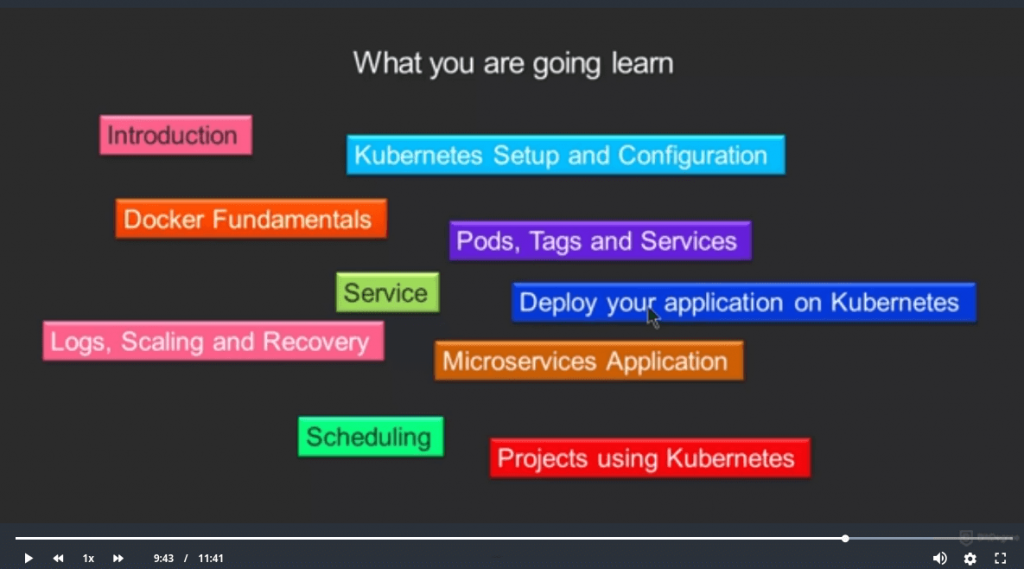
Like Linux Foundation, BitDegree is a video-based platform. But the videos in Kubernetes Docker Tutorial are much shorter (7 hours compared to 35), and it’s a course for beginners.
The layout for BitDegree is more like Udemy where the courses are low-cost and selection is ample.
Also, BitDegree is on the blockchain.
👾 Read our full BitDegree review to find out what makes this platform stand out.
Course Layout
There are 5 modules in Kubernetes Docker Tutorial where you’ll:
- get introduced to Kubernetes
- set up and configure Kubernetes
- learn Docker fundamentals
- discover pods, tags and services
- manage storage in Kubernetes
💡Docker is an open-source platform used to develop, ship and run applications by using containers.
Basically, Docker helps create containers and Kubernetes lets you run and manage them.
Philians finally found his favorite place to learn online:
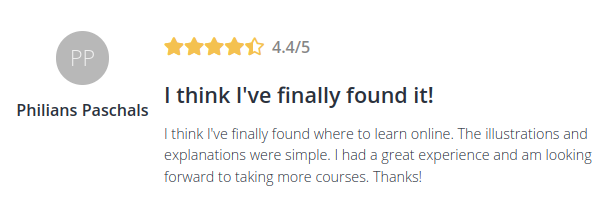
💰 Cost: $247 for the course
⏲️ Duration: 7 hours
📉 Level: Beginner
🖥️ Format: Video
💪 Support: Yes
🎖️ Certificate: Yes
📚 Learn how Kubernetes can help you achieve velocity, agility, reliability and efficiency with the book Kubernetes: Up and Running.
4. Kubernetes for Developers: Core Concepts: Pluralsight
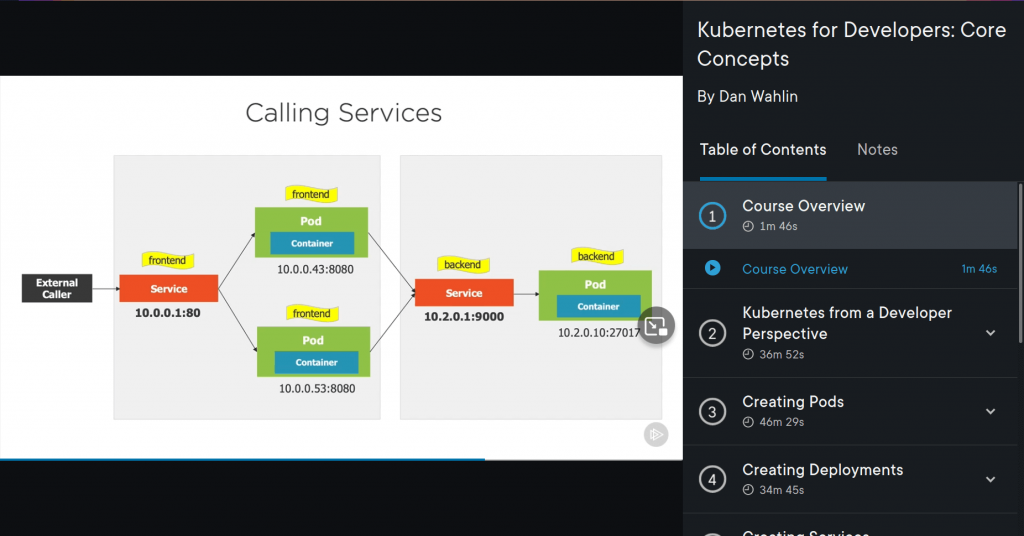
Pluralsight is similar to BitDegree: it’s a video-based platform without excess. What you see is what you get, and you’ll do all work on your local machine.
But you’ll notice the courses are a bit shorter on Pluralsight. Their explanations are a bit more brief and encourage more independent learning as opposed to step-by-step walkthroughs.
Course Layout
Kubernetes for Developers has 8 modules where you’ll learn how to get your application containers into Kubernetes. From a developer perspective, you’ll learn how to:
- get Kubernetes up and running
- interact with Kubernetes using kubectl
- work with deployments
- troubleshoot Pods
And much, much more.
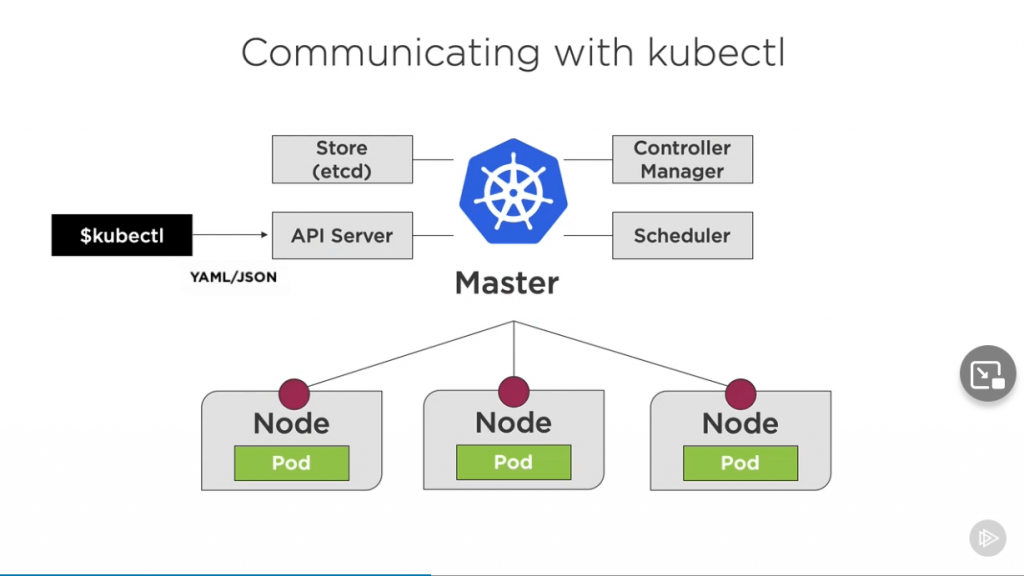
About the Instructor:
Dan Wahlin is a Google GDE and Microsoft MVP. He has a consulting business where we provides training services for Docker, JavaScript, Web API, and more.
❓Want to know what we think of Pluralsight? Read our full Pluralsight review.
💰 Cost: $29 per month or $299 per year for all courses and Learning Tracks
⏲️ Duration: 4.5 hours
📉 Level: Beginner
🖥️ Format: Video
💪 Support: No
🎖️ Certificate: Yes
📚 Deploy and manage containerized applications at scale with The Kubernetes Book.
5. Introduction to Containers w/ Docker, Kubernetes & OpenShift: Coursera
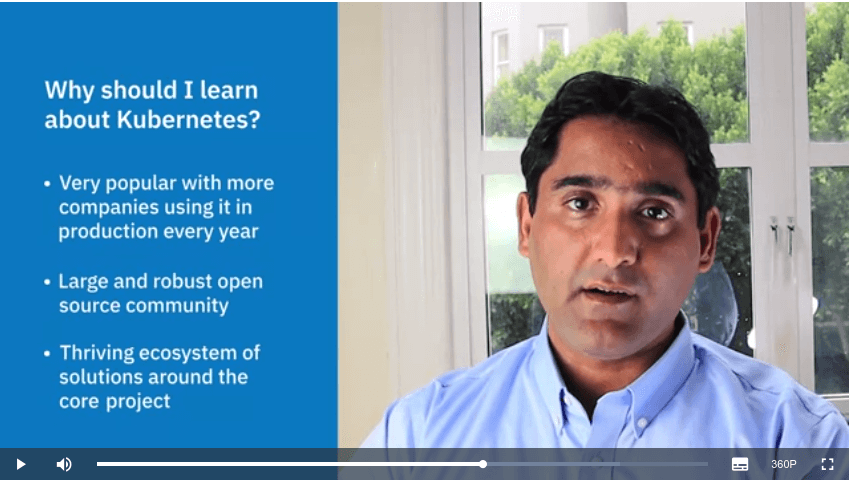
Coursera is another video-based platform in our search for the best Kubernetes course. But unlike other platforms, you’ll find plenty of articles within Introduction to Containers w/ Docker, Kubernetes & OpenShift. You’ll do all work on your local machine.
Course Layout
Introduction to Containers w/ Docker Kubernetes & OpenShift is broken down into 5, week-long modules. With hands-on labs, you’ll discover:
- getting started with Docker
- scaling with Kubernetes
- deploying with OpenShift
In the course’s final project, you’ll build a container image which you’ll deploy and scale on the cloud using OpenShift.
💡 Red Hat OpenShift is a Platform as a Service (Paas) which enables you to develop and deploy your applications on the cloud.
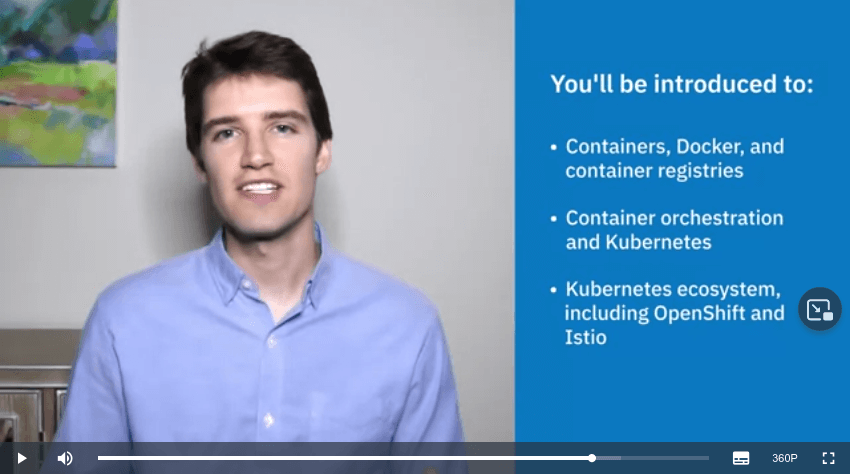
😰 To Coursera or not Coursera? That is the question. Read our full Coursera review.
💰 Cost: $39 per month for the course
⏲️ Duration: 11 hours
📉 Level: Beginner
🖥️ Format: Video
💪 Support: Yes
🎖️ Certificate: Yes
Best Kubernetes Course: Conclusion
Today we looked at the best Kubernetes course including:
🔥 Best Overall 🔥
Kubernetes for Developers: Linux Foundation
💸 Best Value 💸
Kubernetes Docker Tutorial: Complete Course – 2 in 1 Hands On!: BitDegree
So whether you want top shelf or a killer value, we think we’ve got the best Kubernetes course for just about everyone’s needs.
People are also reading:
- 8 Best Cloud Courses This Year [Learn Cloud Computing ASAP]
- DevOps for Developers: Learn Docker, Kubernetes & More [Educative.io Course Review]
What is the best Kubernetes course?
Overall, we think the best Kubernetes course is Kubernetes for Developers by the Linux Foundation. For best value, we liked Kubernetes Docker Tutorial: Complete Course – 2 in 1 Hands On! by BitDegree. You can learn about more Kubernetes courses in today’s post.
What does Kubernetes do?
Kubernetes is an open-source container management tool originally created by Google. It automates computer application deployment, management and scaling. Learn more about Kubernetes in today’s article where we look at some of the best Kubernetes courses of this year.
How does Docker work with Kubernetes?
Docker is an open-source platform used to develop, ship and run applications by using containers. Basically, Docker helps create containers and Kubernetes lets you run and manage them. You can learn more about Kubernetes in today’s post where we’re looking at the best Kubernetes courses of this year.
What companies use Kubernetes?
According to stackshare, over 2800 companies use Kubernetes in their tech stacks including Google, Shopify, Slack, Robinhood and beyond. And that number continues to grow. To learn more about Kubernetes, tune into today’s post where we look at the best Kubernetes courses of this year.
![best kubernetes course this year [our top 5 picks: learn kubernetes asap]](https://realtoughcandy.com/wp-content/uploads/2021/06/newest-best-kubernetes-course-cover-1024x576.jpg)
